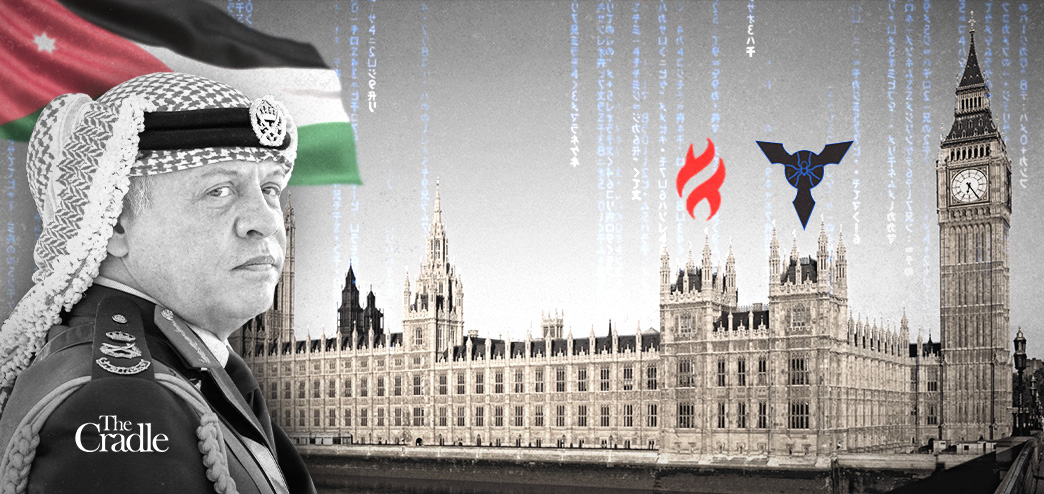Britain Provided Jordan With Techniques and Means of Spying on Its Citizens

The Cradle magazine published an investigation by the journalist Kit Klarenberg entitled: How Britain trains Jordan to spy on its citizens. The investigation confirmed that the British government secretly trained the Jordanian security services in techniques known as digital media exploitation, which were used to monitor, manipulate and disrupt opposition in the kingdom.
Leaked documents reviewed by the investigation revealed that Britain secretly trained Jordanian security services in techniques used by the notorious British cybersecurity agency GCHQ, which provides intelligence to the British government and its armed forces.

Photo Credit: The Cradle
Leaked files
The investigation indicated that Britain conducted more than three intensive training courses, over the course of a week, funded by the Ministry of Foreign Affairs between June 2019 and March 2020.
The members, selected by the British Embassy in Amman, received training on the finer points of how to exploit digital media.
In theory, the purpose of the exercise was to help evidence-gathering agencies in Jordan to effectively extract data from digital devices to enhance their investigative capabilities and improve the level of prosecutions, especially in the field of terrorism.
This, in turn, will enable the exchange of evidence between Amman and London and will lead to increased operational cooperation, according to the author of the investigation.
The investigation pointed out that the officially stated lofty goals of the various security support and reform programs offered by the government in West Asia may not correspond to the basic reality of these efforts.
For example, this outlet has previously exposed how British agents and technology were placed in Lebanese intelligence services under the guise of teaching them how to use digital forensic tools. This allows London to closely monitor their activities—and Lebanese citizens.
It noted that the monitoring software is being delivered by the British government contractor Torchlight, a company that employs UK military and intelligence veterans who have high-level security clearances. The same company was behind the training provided to the Jordanian Special Branch.
According to its submissions to the State Department, based on a comprehensive field visit in 2018, the directorate’s agents were already satisfactorily equipped in terms of hardware and software to perform “digital media exploitation.”
Not surprisingly, Britain is willing to export these technologies to Jordan. The strict and widely criticized cybercrime law, which restricts freedom of expression online and citizens’ right to privacy, makes the country an ideal launching pad for London’s nefarious activities elsewhere in West Asia. It helps keep their presence and intentions a secret.
For example, from the early days of the Syrian crisis, the UK operated a site 45 minutes from Amman, where fighters for proxy warfare were trained. Leaked files related to the project predicted that some of these individuals would go on to join ISIS and that equipment would be stolen and used by them.
Despite this, the State Department was not interested in these possibilities, likely because there was little risk that they would be disclosed publicly or about the training program in general.

Serious Crime
The magazine emphasized that criticizing King Abdullah II in Jordan is a very serious crime, as journalists are routinely harassed, arrested, and prosecuted by the authorities because of critical reports or social media posts.
So the prospect of Jordan’s intelligence services being adept at insidious espionage techniques is, by definition, troubling.
In April 2022, the members of the Jordanian Journalists Syndicate expressed their concern about a report by the human rights organization Front Line Defenders, in which it revealed that the phones of 4 journalists and human rights activists had been spied on through the Pegasus software developed by the Israeli company NSO.
The Front Line Defenders report called for the government to open an extensive investigation to reveal the validity of what is stated in it. The accusations leveled by the report against the authorities necessitate the disclosure of details related to the matter, especially since the spyware program is owned by an Israeli company.
The activists in Jordan stressed at the time the need for the Jordan Open Source Association (JOSA), which participated in the referral of a number of mobile phones in cooperation with Citizen Lab and Front Line Defenders, to disclose its information regarding the use of spyware against Jordanian journalists and activists.
The members of the JPA Council indicated that the government’s silence on what Front Line Defenders published raises several questions among the members of the Syndicate Council, whether in terms of the accuracy of what was stated in the circulated media reports or in terms of the official efforts to preserve the privacy of individuals in the Jordanian conservative society and protect them from random and organized electronic espionage attacks.
It affirmed the right of all Jordanian journalists and activists to preserve their privacy, at the public and private levels, away from the eyes of random and organized snoopers, which is an inherent right guaranteed by the Jordanian constitution, followed by the laws in force.

Pegasus Scandal
The investigation conducted by the human rights organization Front Line Defenders and Citizen Lab revealed that the mobile phones of four human rights defenders, lawyers, and journalists in Jordan had been hacked, using the Pegasus technology developed by the Israeli software and high-tech company NSO between August 2019 and December 2021.
The breach targeted human rights defender, anti-corruption activist, and member of the Jordanian Hirak—a popular protest movement in the field of social justice calling for reform and human rights—Ahmed al-Neimat. In 2018, Jordanian security forces imposed a travel ban on al-Neimat, and he was also prevented from working.
The report stated that the investigation of the four people’s phones identified two Pegasus operators that are likely to be agencies affiliated with the Jordanian government, namely MANSAF, which has been active since December 2018, and BLACKIRIS, which has been active since December 2020 at the least.
The National Indicative Center for Cybersecurity in Jordan denied what it described as allegations contained in the Front Line Defenders report about the presence of government agents targeting the phones of Jordanian citizens using Pegasus.
It added in a statement that “these allegations are baseless, and that Jordan has not cooperated with any agents with the aim of spying on citizens’ phones or imposing censorship on their calls.”










